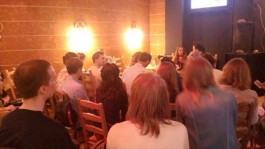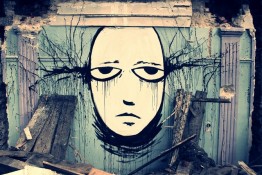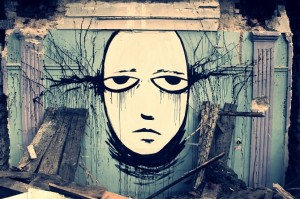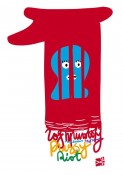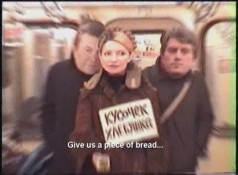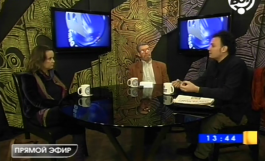was founded by Mykola Ridnyi, Serhiy Popov and Ganna Kriventsova in 2005, and has pushed the boundaries of curatorial and artistic practice of what is considered acceptable in the Ukrainian context.
//////////////////////////////////////////////////////////////
SOSka group was found in 2005 by Mykola Ridnyi (born 1985), Serhiy Popov (born 1978), Ganna Kriventsova (born 1985) in Kharkiv, UA. Currently SOSka group includes two regular participants: Mykola Ridnyi and Serhiy Popov.
In 2005 – 2012 participants of the group ensured curatorial activities connected with SOSka gallery-lab in Kharkiv – independent platform for developing local art sphere.
In 2009 curated international exhibition “The New History” in Kharkiv museum of art.
Since 2011 the group co-founded Days of appartment exhibitions, a festival of self-organized exhibitions in Kharkiv.
Awards and fellowship
2007 – Young artist prize from CEE Henkel Art Award. Vienna. AT
2008 – artist-in-residence program. KulturKontaktAustria, Vienna. AT
2011 – Guest Room Maribor, residence program. Maribor. SL
Selected solo exhibitions
2010 – “Memorial”. Curated by Francesca Solero. Project WE. Turin. IT
2009 – “Barter”. Curated by Vesna Krstich and Nikolas Drosos. The Cardboard gallery, Dumbo art centre. New York. US
2008 – “Dreamers”. Solo exhibition. Project Room, PinchukArtCentre. Kyiv. UA
Selected group exhibitions
2013 – “Ukrainian News”. Center for contemporary art Ujazdowski Castle. Warsaw, PL
2013 – “Living as form (the nomadic version)”. Center of creative initiatives Fabrika. Moskow, RU
2012 – “Environ. Expirience of non institutional relationships. Kharkiv, 2004 – 2012”. Center of creative initiatives Fabrika. Moskow, RU
2012 – “Shelter”. Kunstverein das weisse haus. Vienna, AT
2012 – “Double game”. Special project of the 1st Kyiv biennial for contemporary art Arsenale. Art Arsenal. Kyiv. UA
2012 – “Angry birds”. Museum of modern art. Warsaw. PL
2011 – “The Global Contemporary. Art Worlds After 1989”. Curated by Peter Weibel, Andrea Buddensieg. ZKM / Centre for art and media. Karlsruhe. DE
2011 – “A Complicated Relation, part II”. Curated by Martin Shibli. Kalmar Konstmuseum. Kalmar. SE
2011 – “Impossible Community”. Curated by Victor Misiano. Moscow Museum of modern art. Moscow. RU
2011 – “An Elusive Object of Art”. Curated by Iara Boubnova. Galerie Dana Charkasi. Vienna. AT
2010 – “Intercool 3.0”. Curated by Birgit Richard, Inke Arns. Hartware MedienKunstVerein / Dortmunder U. Dortmund. DE
2010 – “IF. Ukrainian art in transition”. Curated by Ekaterina Degot. Musem for contemporary art. Perm. RU
2009 – “Wakefield Meadows”. Curated by Anca Mihulet. Pavilion UniCredit. Bucharest. RO
2009 – “The (Re) Socialization Of Art”. Curated by Reinigungsgesellschaft. Museum of modern art, Odessa, UA
2009 – “The future was yesterday”. Curated by R.E.P. group and Loose Associations. Student center gallery. Zagreb. HR
2009 – “Il Castello di Rivara apre le cantine”. Curated by Francesca Solero. Centro d’Arte Contemporanea Castello di Rivara. Turin. IT
2009 – “Curated by”. Gallery Hubert Winter / Vienna fair. Vienna. AT
2009 – “The New History”. Curated by SOSka group. Kharkiv museum of art. Kharkiv. UA
2008 – “New Print Politick: Post-Soviet Politics and Contemporary Art”. Ukrainian Institute of modern art. Chicago. US
2008 – “Artists in residence”. Art point at KulturKontaktAustria. Vienna. AT
2008 – «Grabbing at straws». Curated by Negative Capability (Chris Sharp, Joanna Fiduccia). Guenzani studio. Milan. IT
2008 – “68:08. Politics on streets”. Project Fabrica. Moscow. RU
2007 – “The Art World”. Gallery Feinkost. Berlin. DE
2007 – “Communities. Young art of Ukraine”. Gallery Arsenal. Byalystok. PL
2007 – “Critically in between”. Curated by Viktor Misiano in frame of exhibition cycle “Progressive nostalgia”. Art-Athens. Athens. GR
2006 – «Team colors». Gallery «F.A.I.T». Krakow. PL
2006 – «New communities». Caucasus biennale of contemporary art. Tbilisi. GE
2005 – «XXX». Gallery-laboratory SOSka. Kharkiv. UA
2005 – «SOSka artists». Gallery-laboratory SOSka. Kharkiv. UA
Selected publications and reviews
“Scouting Ukraine: SOSka group” by Ekaterina Rietz-Rakul and Steve Schepens, Metropolis M magazine, №3 (33), Amsterdam, 2012
“Angry birds”. Exhibition catalogue. Museum of moder art, Warsaw, 2012
“The Global Contemporary. Art Worlds After 1989”. Exhibition newspaper. ZKM / Centre for art and media. Karlsruhe. 2011
“Fin arts – Die feine Kunst und die Kunst der Finanzen” by Irini Athanassakis. Kunstforum International, № 200: Kunst und Wirtschaft, 2010
“Post Gogol” by Steve Barnes. ARTnews, volume 109 / №5. New York, 2010
“To the South and Slightly to the West” by Ekaterina Degot. “If. Ukrainian art in transition”, exhibition catalogue. Perm museum for contemporary art, 2010
“Torino. Noi alternative. We” by Lorena Tadorni. Flash Art Italy, May, 2010
“We are Ukrainians” by Claire Staebler. Flash Art International, № 269, November-December, 2009
“The Vallue issue” by Elsy Lahner / Jasper Sharp. Parabol Art magazine, №5. Vienna, 2009
“Wakefield meadows” by Anca Mihulet. Wakefield meadows, exhibition catalogue. Unicredit Pavilion, Bucharest, 2009
“Prospects of a loboratory” by Mykola Ridnyi and Anna Kriventsova. Moskow Art magazine, № 73/74, 2009
“Nothing but your dreams. On Dreamers project by SOSka group” by Victor Misiano. Dreamers, exhibition catalogue. PinchukArtCentre, Kyiv, 2008
“Between action and institution” by Ganna Kriventsova, Moskow Art magazine, № 67/68, 2008
“Eastern Unorthodox: Artists in search of a post-Soviet Ukrainian reality” by Jason Foumberg. Newcity Art, Chicago, September, 9th, 2008
“Catalogue / Art World /” by Ivan Mecl. Umelec English version. Prague, №1 – 2008
“Vom Nonkonformismus zur Orange revolution. Zur aktuallen Kunst der Ukraine” by Hlib Vysheslavsky. Postorange, exhibition catalogue. Kunsthalle, Vienna, 2006
























































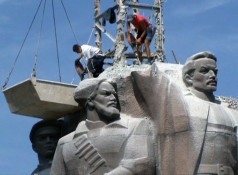
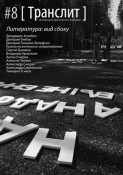
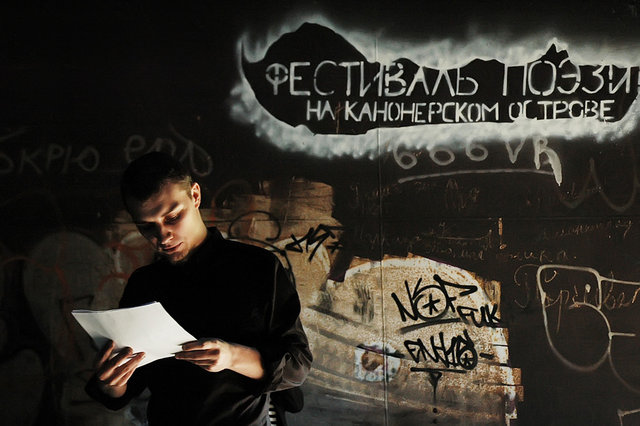 Founded due to the temporary closure of the European University in Saint Petersburg in 2008, the SU has lived on as an autonomous initiative dealing with issues such as runaway urban development, activist interaction with the police, art and democracy, and censorship.
Founded due to the temporary closure of the European University in Saint Petersburg in 2008, the SU has lived on as an autonomous initiative dealing with issues such as runaway urban development, activist interaction with the police, art and democracy, and censorship.